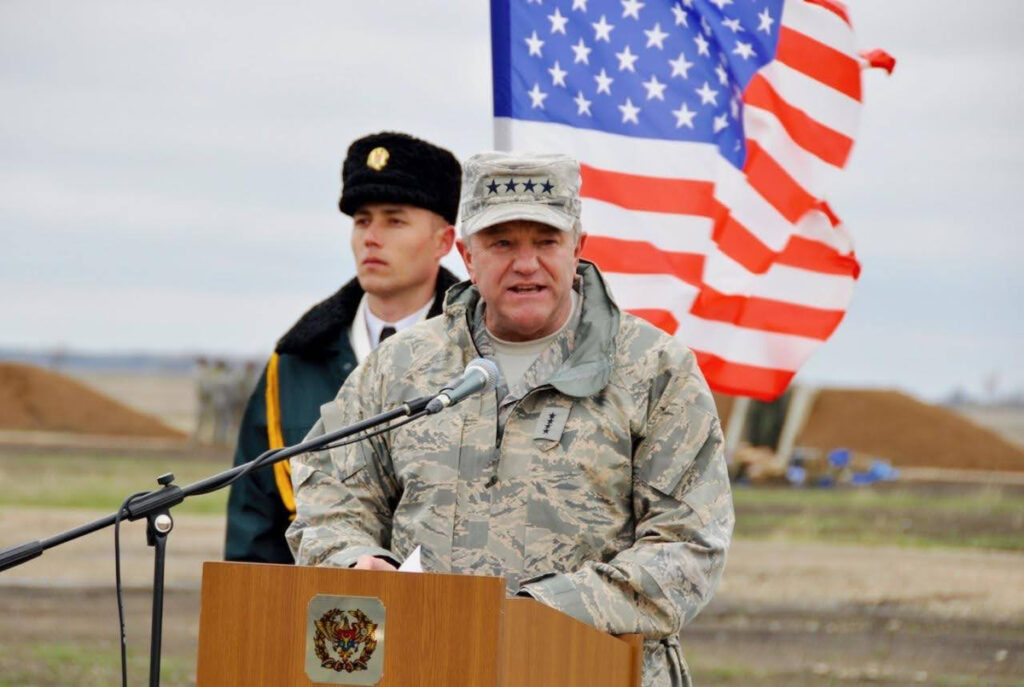
WASHINGTON, DC – The escalating “hybrid attacks” on NATO member Lithuania underscore a broader strategic failure, with the West appearing “completely deterred” by Russia, according to retired four-star US General Philip Breedlove. The former Supreme Allied Commander, Europe (SACEUR), delivered this stark assessment in an interview with the Kyiv Post on Monday.
Gen. Breedlove argues that the West’s current diplomatic and military approach is flawed, as Moscow shows no genuine interest in peace. This conviction forms the basis of his critique, which he believes Western leaders are only beginning to understand.
Russia’s Perpetual War Mentality
Gen. Breedlove’s most unequivocal statement targets the diplomatic debate surrounding Russia’s war on Ukraine. He asserts that Western leaders are finally grasping a grim reality long championed by Ukraine and its allies: Moscow is not interested in peace.
“Russia has never been, and is not now interested in peace, and will never, in the future, be interested in peace. The sooner Western leadership understands this and accepts the truth, then we can get on with taking care of Russia,” Gen. Breedlove emphasized.
Balloon Crisis and Breedlove’s Call for Action
Gen. Breedlove’s comments come as Lithuania battles to secure its airspace from dozens of helium-filled balloons, believed to be smuggling contraband, drifting over the border from Belarus. This issue has forced Vilnius Airport to close multiple times over the weekend, grounding over 16,500 passengers. In response, the Lithuanian government has denounced a “hybrid attack” and taken aggressive measures.
Prime Minister Inga Ruginienė declared that the country’s army is taking “all necessary measures” to shoot down the balloons and has indefinitely closed border crossings with Belarus. “Autocrats are once again testing the resilience of EU and NATO against hybrid threats,” Ruginienė wrote on social media, adding, “Our response will determine how far autocrats dare to go.”
The Lithuanian Foreign Ministry has issued a strong protest to Belarus over the constant violations of Lithuanian airspace. Gen. Breedlove characterized these low-tech incursions as a deliberate tactic by Russia and its proxy to assess the Western response. The stakes, according to Western officials, are high.
A senior Western official told Kyiv Post, “Are we seriously going to allow balloons from Belarus to affect airspace in a European Union and NATO nation?”
General’s Strategic Prescription
To counter this persistent campaign of intimidation, Gen. Breedlove laid out an urgent strategic shift beyond rhetoric, focusing on military posture and resource management. He demands NATO end its relaxed defense posture and elevate its readiness status immediately. The current “air policing” should be replaced with an “Air Defense alert” status, allowing nations to take proactive action.
Furthermore, Gen. Breedlove urged Western forces to avoid using costly armaments against cheap threats. NATO should cease shooting at balloons with “multi-million dollar missiles” because “trading a multi-million dollar missile for a balloon is exactly what Russia wants us to do.” Instead, the alliance must innovate its defense strategies, such as using specialized tools mounted on existing airplanes or drones.
Finally, Gen. Breedlove emphasized the need for the West to reverse the dynamic of being deterred. The West must regain the initiative by increasing the cost on Russia, because “Putin is going to push until somebody pushes back,” and until that happens, Russia will continue to use tools that are working.
United EU Leaders Condemn Hybrid Threat
Gen. Breedlove’s warning resonated with strong condemnations from Europe. EU leaders quickly rallied around Vilnius, labeling the incursions as a form of non-military aggression. European Commission President Ursula von der Leyen stated in a social media post that Europe stands in “full solidarity with Lithuania in the face of the persistent incursions of helium smuggling balloons into its airspace.” She called the actions “destabilization” and “provocation.”
“We call it by its name: a hybrid threat. We will not tolerate it,” she said, adding that the situation is yet another reason to accelerate their flagships – the Eastern Flank Watch and the European drone defense initiative.
European Parliament President Roberta Metsola, visiting Washington, reaffirmed the commitment to the security of the continent’s borders. She expressed “steadfast solidarity with the people of Lithuania in the wake of the hybrid threats from Belarus” and underlined the commitment to Europe’s border security.
António Costa, the president of the European Council, stressed the need for Belarus to cease hostile acts, stating, “hybrid activities must stop and Belarus must prevent further incidents.” He concluded that the EU will continue to pressure the regime for its complicity in Russia’s war against Ukraine and support the protection of the EU’s eastern border.
Nuclear Intimidation and Economic Squeeze
Gen. Breedlove connected Russia’s escalating provocations to the economic pressure Vladimir Putin faces. “Putin is in a bad place right now,” Gen. Breedlove observed, noting that “His economy is not doing good. He’s under a lot of pressure in his main sector, which is petroleum production.”
He noted that Ukraine is hitting Russian refineries hard, leading Putin to “lash out with the tools that he can.” This economic pain, Breedlove argues, drives Putin to rely on “his war of words and his war of intimidation,” which famously includes nuclear threats.
“Putin always rolls out something nuclear when he wants to scare the West, because it works,” Gen. Breedlove concluded, adding that “the West is nearly completely deterred when it comes to Mr. Putin’s threats of nuclear weapons.”
The situation remains tense as Western leaders consider their next steps in responding to Russia’s hybrid warfare tactics. The strategic recalibration suggested by Gen. Breedlove could mark a significant shift in NATO’s defense posture, potentially altering the dynamics of power and deterrence in the region.






